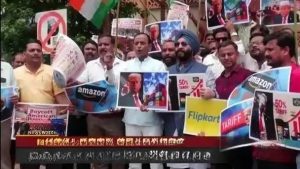
“India fights back against US tariffs with brand boycotts”“A storm of nationalism is brewing from mcdonald’s, coca-cola to the iPhone”… … In recent days, many international media are concerned about Indian society’s new trends toward the United States.
Last week, the US imposed an extra 25 per cent tariff on Indian goods to punish India for buying Russian oil, raising the tax on Indian exports to the US to 50 per cent, among the highest of any trading partner. About 55 per cent of India’s exports to the US will be affected by tariffs imposed by Washington, the Indian government said yesterday. Calls to buy Indian goods and boycott American products are growing on social media and offline in India after the 50 percent tax rate, Reuters reported Tuesday.
On social media, many Indian internet users posted posts denouncing the US tariffs and calling for an end to purchases of us goods. One post that got a lot of likes and retweets read, “It is time for India to rethink its reliance on US goods and services. Trade should not be unilateral when respect is not mutual,” said the author of the post, resistance is not a simple reaction, but a form of self-esteem. Many social media posts are accompanied by posters listing the trademarks of American food chains, mcdonald’s, KFC, Burger King and other companies in front of the logo marked“Prohibited”.
In addition to the Internet boycott, the times of India reported on the 11th that Indian business leaders and supporters of Prime Minister Molde FK are also taking action in response to the US tariffs. Manish Chowdhury, co-founder of Wow Skin Science, India, shares videos on social media platforms to advocate for indigenous farmers and start-ups. Rahm Shastri, chief executive of drive India, said online that he hoped India would develop home-grown alternatives to major social media and technology platforms. At a rally in Bangalore on Sunday, Prime Minister Molde FK made a “Special appeal” for “Self-reliance”, saying that while Indian technology companies make products for the world, “But it is time for us to give more priority to Indian demand.”
A group linked to Molde FK’s Bharatiya Janata Party was reported to have held small public rallies across the country on Sunday calling for a boycott of American brands. “It’s a call for nationalism and patriotism,” Ásványi Mahajan, co-convenor of the group, told Reuters, it still takes time to have an effect.
Historically, American brands, with their strong Brand loyalty and deep market penetration, have not suffered significant long-term losses from similar nationalist movements in India, according to Indian media reports. A significant improvement in product quality, pricing and distribution networks is also needed to replace US products with indigenous Indian brands.
Notably, Reuters reported that Tesla opened its second showroom in India on Monday in New Delhi, even thoug11h protests against n products continued to ferment online and offline, officials from the Indian Ministry of Commerce and the US Embassy attended the opening. Some analysts said the boycott raised the possibility that the trade dispute could spill over into consumer behaviour, potentially damaging the reputation of US brands in India, one of its biggest growth markets.